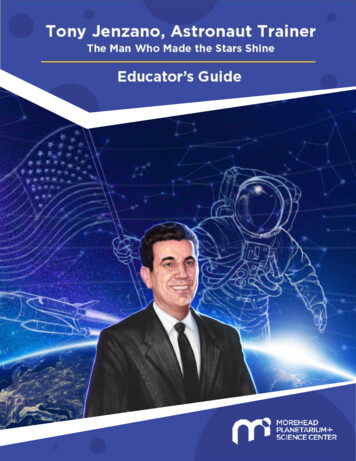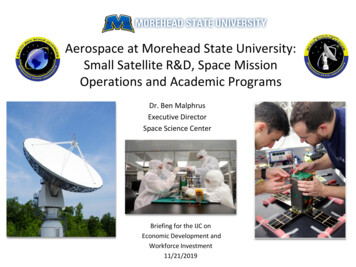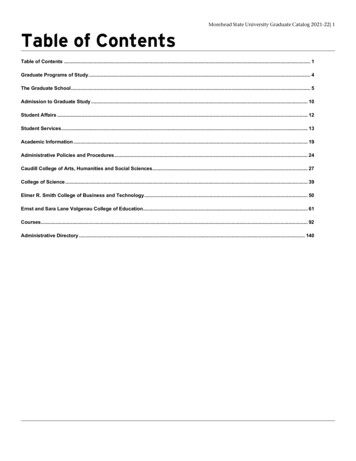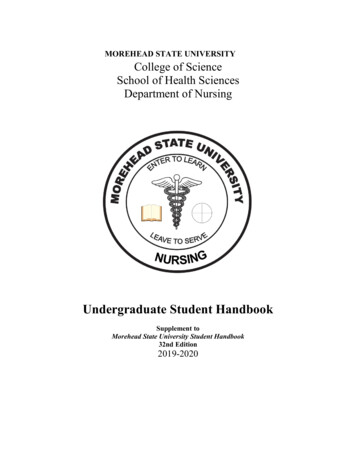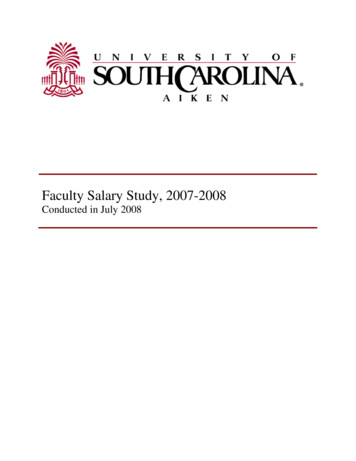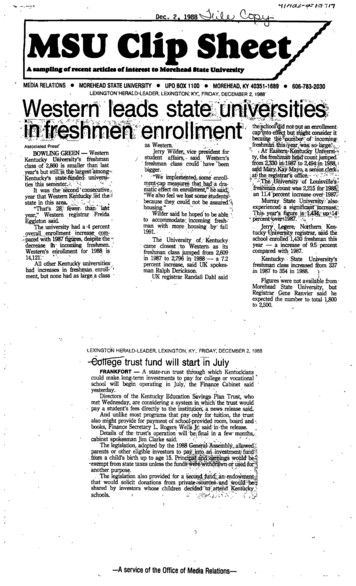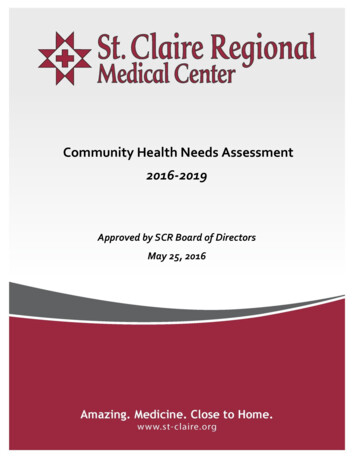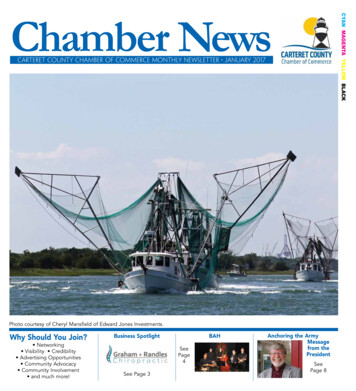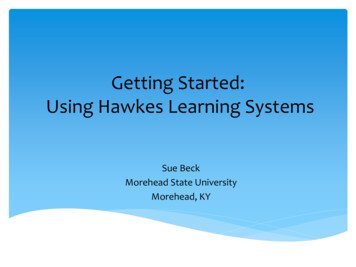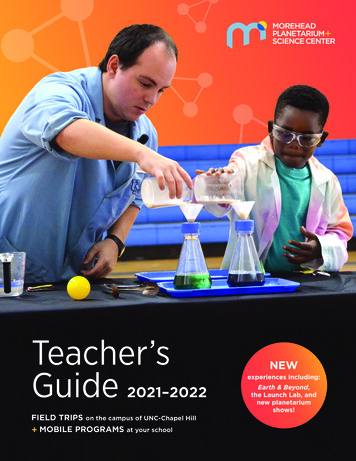
Transcription
PLANETARIUM SHOWSTeacher’sGuide 2021–2022FIELD TRIPS on the campus of UNC-Chapel Hill MOBILE PROGRAMS at your schoolNEWexperiences including:Earth & Beyond,the Launch Lab, andnew planetariumshows!1
PLANETARIUM SHOWSWhat’s Inside?FIELD TRIPS AT MOREHEADScience LIVE! Programs4Enrichment Experiences5Launch Lab5Planetarium Shows6–7MOBILE PROGRAMS AT YOUR SCHOOL24–78–11Our Physical World Live!8Morehead in Motion: Lab to Life9Morehead in Motion: Earth & Beyond10Virtual Field Trips – Virtual STEMville!11NORTH CAROLINA SCIENCE FESTIVAL12MAKING A RESERVATION13PRICING14FREQUENTLY ASKED QUESTIONS15ABOUT USCONTACTMorehead Planetarium and Science Center isa unit of the University of North Carolina atChapel Hill and was the first and largest fulldomeplanetarium in the south. Today, we remain oneof the premier planetarium and science centers inthe country with the bold mission to serve NorthCarolina and beyond by bringing together theunique resources of UNC to engage the publicfor an improved public understanding of science,technology and health.Morehead Reservations Team919-962-1236mpsc reservations@unc.edu
What’s NewAT MOREHEADDon’t miss our new hands-onLaunch Lab (pg 5), planetariumshows (pg 6–7), and at-your-schoolprogramming (pg 8–11).Learning throughexhibitsCompleted in the Fall of 2020, our recent renovation transformed MoreheadASK ABOUTinto a full-service planetarium and museum with more interactive exhibits.OUR EXHIBITThe Ivan R. King Gateway Gallery is located in our rotunda and containsCHALLENGEGUIDE!exhibits that focus on the history of UNC, Morehead Planetarium, and theastronaut training program that took place in the 1960s and 1970s. TheBreakthrough Hub exhibit space focuses on current UNC research in PublicHealth, Astronomy, Marine Science, Plant Ecology, and Biomedical Engineering.Explore the StarsScience KitsCOMINGSOONRecommended grades 2–7AVAILABLE IN ENGLISH AND SPANISHAre you ready to explore the stars? New for this year,Morehead is offering bilingual Explore the Stars kits!We’ve created an easy-to-use kit that includes a bilingualstorybook, online resources, and 4 hands-on activities:· Moon Phases· Sundial· Spectroscope· Star FinderKits will be shipped in early 2022. Learn more andpre-order your kit by November 1 by going igned with Safety in MindEach Morehead program has been designed with a set of evidence-basedprotocols to deliver maximum science fun while keeping students and teacherssafe. Read the details of each program online to learn about its COVID protocols.3
FIELD TRIPS AT MOREHEADField TripsAT MOREHEADMOREHEADPLANETARIUM.ORG/FIELD-TRIPSScience LIVE! ProgramsGRADESLENGTHMAX. PARTICIPANTSK–1245 min.74 persons per showLive shows on Morehead’s Science Stage captivate students of all ages! Each“Science LIVE!” program engages the audience and asks for volunteers toparticipate in exciting science demonstrations. Specific demonstrations may varydepending on grade level.SCIENCE LIVE! PHENOMENAL PHYSICSSCIENCE LIVE! MAGNIFICENT MATTERIn a program that Isaac Newton would have loved toattend, we will explore the fundamentals of physicsthrough live experiments. We’ll talk about forces andmotion with some Carolina basketball flair, generatethousands of watts of electricity with our hair-raising VanDer Graaff generator, and do the coolest demonstrationever, literally, by observing nitrogen in two phases.Matter makes up everything — it surrounds you, and caneven change its appearance right before your eyes! Wewill learn about the states of matter, examine some trickymaterials that exist between states of matter, make instant“snow,” and cap it all off by observing some colorfulcombustions using the chemical properties of differentelements.SCIENCE LIVE! UNDER PRESSURESCIENCE LIVE! SCIENCE SHOWTIMEWe put science under pressure in this program. We’lldemonstrate Bernoulli’s principle with a 10-foot-long bagand just your breath, demonstrate how much air weighsby crushing a can, try to burst balloons with hundreds ofnails, and make a huge combustion in our “whoosh bottle.”For the very young scientists of the world (minimum ageof 4 years old), we’ll demonstrate some of Morehead’smost exciting science experiments. Participants will learnhow we experiment with different materials and see howmuch fun science can really be in an accessible way.SCIENCE LIVE! ALL SYSTEMS GOSCIENCE LIVE! LIGHTUP THE STAGEOur bodies need to be “all systems go” for us to getthrough each day. Join us to take an in-depth look athair, skin and fingernails with a digital microscope, createan electrical circuit with your body, ignite a jelly bean todemonstrate metabolism, and test reaction times of youreyes and hands.4Learn about the properties of lightas we “Light up” the Science Stage!NEW!We will explore and demonstratemany properties of light such asdiffraction, refraction, reflections andfluorescence. We will explore opticalillusions and color using visible and ultraviolet light.
EnrichmentExperiencesGRADES3–8LENGTH45 min.Launch LabGRADES1-12MAX. PARTICIPANTS30 studentsAdd an extra dimension to your visitwith a hands-on, minds-on EnrichmentExperience led by a Morehead educator.LENGTH45 min.MAX. PARTICIPANTS30 studentsLearn by building and discovering inMPSC’s new makerspace! Launch Labprograms are designed to highlightscience topics through hands-on, makercentered activities. Activities andequipment used vary with grade level.Recommended for grades 1–2, recommended showGRASPING AT STRAWS:ROBOTIC HANDS!pairing: Magic Tree House: Space MissionRecommended for grades 1–4How do we know so much about the night sky above ourheads? Well, all you need to do is look! In this eyes-onclass, you will practice using real astronomy equipment liketelescopes and binoculars. You will see what makes themdifferent and learn which one turns you upside down!Learn the basics of hand movement by using commonmaterials to create a model hand that actually moves.Students will use straws, yarn and cardboard to buildartificial ligaments and bones and see how these thingswork together inside your hand.ROUND AND ROUND WE GOVALVES INSIDERecommended for grades 3–4Recommended for grades 3–5Get ready to move as we explore the relationship betweenEarth, Moon and Sun in this highly interactive andkinesthetic class. Why do we have day and night? Whatcauses eclipses? We’ll answer these questions and more aswe “dance the night away.”Valves are all around us and inside us as well! Using avariety of materials, students will create simple typesof valves, test their effectiveness, and discover researchbeing done in the use of artificial heart valves insidethe human body.SEISMIC STUDIESWATER WAYSRecommended for grades 3–5, recommended showpairing: Earthquakes, Volcanoes, and TsunamisRecommended for grades 4–8EYES ON THE SKYHave you ever wondered why we have earthquakes? Inthis hands-on class, you will learn about seismic waves andhow the Earth’s structure leads to earthquakes. You canput your skills to the test by trying to build an earthquakeproof house!SOLAR SYSTEMATICSLearn about water pollution and contaminants as youwork together to create water filters and technology tohelp keep water clean! Students will learn about waterquality testing, basic filtration and ecology.LIGHT POLLUTION CIRCUITSRecommended for grades 6–12What does our Solar System really look like? How do weknow? In this hands-on adventure, students become NASAengineers as they design, build and test interplanetarylanders that are needed to explore rocky worlds like Mars.Light pollution affects animals, astronomers, andhuman health! Learn about this growing issue andwhat can be done to solve it by designing betterstreetlights and measuring equipment. Students willcreate simple circuits and use testing equipment to seehow light can be kept on Earth where it is needed.WINGING ITHIDDEN WORLDSRecommended for grades 3–8, recommended showpairing: Take FlightRecommended for grades 7–12Recommended for grades 3–8For years humans dreamed of flying like the birds. Andnow we can! Join us to test flying machines and investigatethe four forces necessary to get humans, birds and otheranimals off the ground and into the air.FIELD TRIPS AT MOREHEADNEW!Researchers at UNC are actively exploring the world ofthe very small and studying the interactions betweenplants, fungi, and disease. In this class, students willcreate a microscope for use with a tablet or cell phoneand use it to explore the world outside.5
FIELD TRIPS AT MOREHEADPlanetarium ESK–12LENGTH45 min.MAX. PARTICIPANTS210 persons per showMorehead planetarium shows are an excitingway to engage and inspire your students witha love of science.Surround your students with the sights, sounds and sensations ofan extraordinary educational adventure! Each program includes aplanetarium show, a question and answer session with a Moreheadeducator and if time permits, a mini star tour. Some planetarium showsare available with a Spanish language audio track; if needed, pleaserequest this one week in advance.TALES OF THE AMERICAN SOUTHNEW!Recommended for grades 6–12.Additional teaching resources available at amsouth.unc.eduThe American South is shrouded in romance andmyth, and its historical and modern-day realities areboth intriguing and complex. What does it mean tobe from, to live in, and/or teach about the AmericanSouth today?Produced through an innovative partnership betweenMorehead and UNC-Chapel Hill’s Center for the Studyof the American South.6
ASTRONAUTRecommended for grades 4–5(also suitable for grades 6–12)CAROLINA SKIESRecommended for grades 3–12COSMIC COLORSRecommended for grades 2–12GALILEO: THE POWEROF THE TELESCOPESOLAR SYSTEMODYSSEYRecommended for grade 6(also suitable for grades 4–12)Recommended for grades 3 and 6(also suitable for grades 4–8)THE LITTLE STARTHAT COULDTHE SUN: OURLIVING STARRecommended for grades K–2Recommended for grades 6–12THE LONGEST NIGHTSURVEYING THESOLAR SYSTEMRecommended for grades 1–12DYNAMIC EARTHRecommended for grades 6–12EARTH, MOON AND SUNRecommended for grades 1–4(also suitable for grade 5)EARTHQUAKES,VOLCANOS ANDTSUNAMISOPTIONAL SPANISHAUDIO TRACKRecommended for grades 3–5MAGIC TREE HOUSE SPACE MISSIONRecommended for grades K–2(also suitable for grade 3)MOVING ALL AROUNDNEW!Recommended for grades 5–12FIELD TRIPS AT MOREHEADPlanetarium ShowsTAKE FLIGHTRecommended for grades 3–7WE ARE STARSRecommended for grades 6–12Recommended for grades K–2PHANTOM OF THEUNIVERSE: THE HUNTFOR DARK MATTERSuitable for grades 9–12For a detailed list of each show’s correlations with NC Essential Standards for recommended grades, -studyMYSTERIES OF YOUR BRAINNEW!Recommended for grades 5–9Have you ever dreamed of looking at thehuman brain, from inside it?Mysteries of Your Brain takes you on animmersive, animated adventure into thehuman brain, zooming along the path ofneurons and experiencing illusions on a grandscale, exploring how the brain works and whatmakes human brains so special.7
MOBILE PROGRAMS AT YOUR SCHOOLAt Your SchoolMOBILE PROGRAMSMOREHEADPLANETARIUM.ORG/AT-YOUR-SCHOOLOur Physical World Live!GRADESK–8LENGTHvaries(see pricing table)MAX. PARTICIPANTSvaries(see pricing table)NEW!In this new program, a Morehead educator will guide your group through standards-alignedactivities that will explore STEM fields such as chemistry and physics in the classroom. Itsassembly-style component will captivate participants with interactive experiments anddemonstrations performed by a Morehead educator in the school’s gym, auditorium, oroutdoor stage. Students will investigate force and motion, experiment with phase changesand chemical reactions, and explore other topics to support classroom learning.ASSEMBLY-STYLERecommended for grades K–2, 45 minutesLearn about forces and motion as we launch rockets andmake objects levitate in midair. Experiment with phasechanges using balloons and bubbles, perform chemicalreactions to create cascades of colorful foam, and so muchmore. This show will have younger audiences on the edge oftheir seats as we introduce them to the wonderful world ofscience.Recommended for grades 3–5, 60 minutesExplore Newton’s laws of motion with “magic” tricks androcket launches, then conduct hair-raising experiments withelectricity using a Van De Graaff generator. Learn abouthuman body systems with a digital microscope, discoverphase changes with liquid nitrogen, and more. We’ll evenperform a chemical reaction to create a giant, colorful foamexplosion as our grand finale! This dynamic show will amazeyour students while reinforcing key scientific concepts.NEWTON IN MOTIONRecommended for grades K–1, 3, 5, 7Let’s get familiar with physics! The laws of physics impacteverything around us. Students will learn about force andmotion, inertia and other concepts from Newton’s Laws8before applying this knowledge to roller coasters, rocketballoons, and more! Older students will delve further intoapplications of forces and Newton’s Laws and extend theirconnections to potential and kinetic energies.ENERGY SUPPLEMENTSRecommended for grades 3–8Could your students use a jolt of energy? This lessonprovides a broad overview of all ten types of energy,including the distinction between kinetic and potentialenergies. Let’s journey together to discover what energy is,the various forms it can take, and how humans can make useof it all! Students will go through activities and challenges,including understanding how their bodies convert chemicalenergy into movement. Older students will engage in a morein-depth exploration of the same concepts and also makeconnections to the Law of Conservation of Energy.THE STATE OF THINGSRecommended for grades 2–3, 5–6, 8Crazy chemistry abounds as students learn more about thephases of matter and all that they are capable of. Studentswill focus their attention on physical and chemical changesthrough a mix of guided and interactive experiments,including creating a vacuum, dissolving solids in liquids, andproducing neon light!
Lab to LifeGRADES6–12LENGTH75–90 min.MAX. PARTICIPANTS30 students per sessionMorehead’s Lab to Life program is a selection ofhands-on, narrative-driven lessons for middle andhigh school students. Through these chemistry orbiology-focused labs, students will have a chanceto experience what it would be like to work in a variety of STEM careers and see the directapplication of the skills and standards they are learning in their classes.#YESFILTER (WATER TREATMENT)Recommended for chemistry, earth/environmental science,biology, or engineering coursesInvestigate water chemistry and purity in this lab. We’lldiscuss pH to see the connections between water, acid/base chemistry, and life. Then, we’ll simulate part of thewater treatment process by creating a custom filter toclean a sample of polluted water.TREEGONOMETRY (FIELD STUDY)MYSTERY OF THE CROOKED CELL(GEL ELECTROPHORESIS)Recommended for biology, anatomy and physiology,or allied health coursesDiscover the molecular basis of sickle cell disease and usegel electrophoresis as a diagnostic tool to differentiatewild-type hemoglobin from mutated hemoglobin found inindividuals with sickle cell disease. Module developed byBoston University School of Medicine CityLab.Recommended for biology, earth/environmental science,forestry, trigonometry, or geometry coursesBIOLOGICAL BODYGUARDS(ELISA TEST)Investigate complex relationships between organisms andthe physical and biological environment, as well as themovement of energy and materials within an ecosystem.Employ various environmental sampling technologiesto determine the disposition of both biotic and abioticfactors within an assigned study site.Recommended for biology, applied science, anatomyand physiology, allied health coursesNote: This lab is conducted outside. As such, it isweather-dependent and is only offered in September,October, late March, April, and May.DEEP SEA DETECTIVES(DNA FINGERPRINTING)Recommended for biology, forensics, oroceanography coursesBecome an oceanographer and use gel electrophoresis(also known as DNA restriction analysis) to analyzesimulated seawater samples to detect environmental DNAto search for and document new species that call theocean’s mysterious twilight zone home.MOBILE PROGRAMS AT YOUR SCHOOLMorehead in Motion:Students will use an Enzyme Linked Immunosorbent Assay(ELISA) to test for a simulated antigen with antibodies.This lab can be used to model how those in science andmedical careers use this process to screen hypotheticalpatients for disease, test water samples for toxins, oranother narrative that you request.HYDROELECTRIC ENGINEERINGCHALLENGERecommended for physics, earth/environmental science,physical science, biology coursesLearn the fundamentals of electrical power generationby researching the relationship between electricity andmagnetism, and how this led to the development of theelectric motor. We’ll discuss renewable and nonrenewableenergy sources, and engage in the engineering cycle tocreate a prototype hydroelectric turbine.9
MOBILE PROGRAMS AT YOUR SCHOOLNEW!Morehead in Motion:Earth & BeyondGRADESK–12LENGTH60–75 min.MAX. PARTICIPANTS25 students per sessionIn this new Morehead program, students participate in standards-aligned lessons thatexplore earth science and astronomy concepts. Students experience exciting astronomyvisualizations, explore moon phases and light, learn to map planetary surfaces, hunt forexoplanets, and much more!A YEAR OF WEATHERRecommended for grades K–2Have you ever wondered how clouds and rain are formedin the Spring? How can wind blow the leaves from thetrees in Autumn? How does water change into delicatesnowflakes and hazardous ice in Winter? A Year ofWeather helps students visualize the fascinating andvaried changes in our atmosphere throughout the seasons.SPACE OBSERVERSRecommended for grades K–2How do people observe objects that are far away?Students will practice their observational skills to comparehow the views we see are different when we use our eyesand when we use tools like a telescope and binoculars.EARTH & PLANETARY MAPPINGRecommended for grades 3–5What do maps help us learn? How can you learn abouta planet that is covered in clouds? What kinds of toolsdo you need? Students will explore ways that NASA andother space agencies use satellites and other spacecraft toindirectly map the surfaces of planets – including our ownEarth!SOLAR SYSTEM EXPLORATIONRecommended for grades 3–5Have you ever wondered what scientists look for whenwe explore other planets? What features do we use tohelp classify things in our solar system? What in the worldhappened to Pluto?!?! Explore these concepts and morethrough hands-on activities and visualizations to classifyobjects in our solar system, indirectly map a planet’ssurface, and help solve an inter-planetary mystery.CLIMATE TRACKERSRecommended for grades 6–8What is the difference between climate and weather?What is climate change? How do we track the cycling of10water and gases in our own atmosphere? This activitywill help students connect with the global concept ofclimate while using meteorological models and NASAvisualizations to track the vital signs of our planet —including carbon released into the atmosphere.EXOPLANET HUNTERSRecommended for grades 6–8Is there another planet like Earth out there? Are thereother solar systems besides our own? How can we seethings that are so far away? Students will tackle thesequestions using NASA data and visualizations and willexplore some of the thousands of planets outside of ourown solar system. Classifying these otherworldly planetscan help us gain better insight into planet formation andsome of the mysteries of our own Solar System.LIGHT & THE ELECTROMAGNETICSPECTRUMRecommended for grades 9–12How are we able to look so far back into space and time?How does light travel and how do we capture it? Howdoes this journey inform our knowledge of the universe?Where do black holes lead? Students will explore howthe Hubble Space Telescope, the upcoming JamesWebb Space Telescope, and other observatories use theelectromagnetic spectrum to give us a brighter pictureof the matter and structure of the universe. Throughexploration of wavelengths, students will understand howbeautiful astronomical images come to life.OCEAN ACIDIFICATION& CLIMATE CHANGERecommended for grades 9–12How does human activity affect our oceans and seas? Howdo scientists measure changes in the health of the ocean?How does this affect us in North Carolina? As futurescientists, students will perform pH assessment to learnabout ocean acidification and use NASA Earth Sciencedata to track the potential path for rising sea levels.
GRADESK–12LENGTH45 minutesMAX. PARTICIPANTSno min. or max.NEW!On this epic journey, students will explore a variety of STEM concepts through engagingvirtual workshop sessions with Morehead educators and scientists from our state. We’lluse special planetarium software to learn about the sky and other current astronomytopics. We’ll conduct exciting science experiments in our lab, and talk with scientists aboutdifferent scientific methods for their research.SCIENTIST BLOCK PARTY!Elementary School (grades K–5)Recommended for grades 3–12These standards-aligned lessons will focus on objects in oursolar system, how they move and change over time, andhow they fit together to make our place in space so great.Join the dynamic duo of educator and scientist while theyconduct a fun scientific demonstration or activity for yourstudents! Your students will meet a real scientist and learnabout their path to becoming a scientist and how they usethe scientific method in their research!ASTRONOMY AVENUEIn this Virtual STEMville experience, participants will join a360 planetarium show viewing, explore current astronomytopics, learn about hidden science stories, and observe ournight sky using planetarium software.MOBILE PROGRAMS AT YOUR SCHOOLVirtual Field Trips – Virtual STEMville!Middle/High School (grades 6–12)These standards-aligned lessons will focus on current spacemissions, aeronautics, and the exploration of the solarsystem and beyond. Groups will also have the opportunityto dive deeper into current Physics/Astronomy topics. Theselessons will focus on topics ranging from navigating our skywith seasonal constellations to exploring the nature of blackholes.Morehead astronomers and guest scientists may alsoprovide live Q&A and additional activities and resources forfurther at-home science enrichment.!THE MOBILE PLANETARIUM IS UNAVAILABLE FOR REQUESTS DURING THE 2021-2022 SCHOOL YEAR.HOWEVER, ONE OF OUR NEWEST PROGRAMS, “MOREHEAD IN MOTION: EARTH & BEYOND” (SEE PAGE10) FOCUSES ON CONTENT ADDRESSED BY OUR MOBILE PLANETARIUM SHOWS.11
NORTH CAROLINA SCIENCE FESTIVALNorth Carolina Science FestivalNCSCIFEST.ORG/EDUCATORSThe North Carolina Science Festival—founded by Moreheadin 2010—is an annual statewide, month-long celebration ofscience that takes place every April. Hundreds of fun (andusually free) public events will be listed on the NCSciFestwebsite in mid-February.Educators are vital to the North Carolina Science Festival’s mission—they prepare futurescientists! We thank you for everything you do and encourage you to participate in theNCSciFest with your students. We also want to collaborate with you in providing excitingscience experiences. The NCSciFest offers“at-your-site” educational initiatives specifically for K-12 schools.DUKE ENERGY SCIENCE NIGHTSGrades K–5Funding from the Duke Energy Foundation allows NCSciFeststaff to produce STEM activities and resource kits for useby elementary schools across the state. This program isdesigned to help you host a fun science event for yourstudents and their families with the use of a kit that includeshands-on activities aligned with NC Science Standards, aplanning guide, activity instructions, materials for up to 200participants, and the support of NCSciFest staff.The Duke Energy Foundation sponsorship funds a numberof kits to award at no charge. These are awarded to schoolsusing an application process that includes a review of schoolneed, demographics, geography, and past participation.Kits can be purchased and sponsorship applications openstarting in August 2021. Schools hold their family sciencenight during April 2022, bringing families together as acommunity to explore the amazing world of science as partof the North Carolina Science Festival.Learn more about kit contents. application details, andprogram timeline at ncscifest.org/elementarySCIMATCHGrades 6–8The NCSciFest team recruits dynamic and dedicatedscientists from diverse backgrounds to share their excitementabout science with middle school students. SciMatch pairsmiddle school teachers with these scientists to scheduleclassroom visits to speak about their backgrounds andresearch, answer questions about their careers, and engageyour students in a fun, hands-on activity. This program isdesigned to inspire students to consider science as a career.Learn more at ncscifest.org/scimatchPUBLIC EVENTSAll agesThe NCSciFest team and our network of partners across thestate produce hundreds of amazing STEM events for publicand K-12 audiences each April. The calendar of events goeslive on February 14. Find events near you at ncscifest.org12
How to Make a ReservationAPPLY FOR NCSCIFEST PROGRAMS AT NCSCIENCEFESTIVAL.ORG/EDUCATORSFIELD TRIPS AT MOREHEADMOBILE PROGRAMSAT YOUR SCHOOLChoose the experiences you wantfor your Morehead field trip.Choose the experiences you wantfor your Morehead mobile visit. Participate in a Science LIVE!demonstration program Participate in an Our Physical WorldLive! Program (see page 8)(see page 4) Practice hands-on skills with aMorehead in Motion: Lab to Life visitPractice hands-on skills in anenrichment experience(see page 9)(see page 5) Learn by creating in a Launch Labprogram (see page 5) Watch a fulldome show inMorehead’s planetarium Practice hands-on skills with a visitfrom Morehead in Motion:Earth & Beyond(see page 10) (see pages 6–7)Explore STEM concepts with a VirtualSTEMville! Virtual Field Trip (see page 11)Choose the dates for your Morehead scienceexperiences — a first choice, a second choiceand a third choice. Morehead will strive toaccommodate your selection, but cannotguarantee availability.Decide how your school will accommodate avisit from a Morehead mobile program.Decide how your group will travelto Morehead.Based on your response, our outreach teamwill offer you a selection of potential dates.Submit a field trip reservation formonline atmoreheadplanetarium.org/field-tripsEach At-Your-School program has its ownreservation form. Find them online atmoreheadplanetarium.org/at-your-schoolConsider which dates your school would notbe able to accommodate a Morehead visit.DONE!You should receive an email notice that we have received your request within 15 minutes ofsubmitting the form. A Morehead reservations specialist will contact you to confirm the detailsand discuss any special requests you may have.13
FIELD TRIPSPricingPlanetarium Show1, Enrichment Experience,Launch Lab, or Science LIVE! ProgramFirst show or classMorehead in Motion:Lab to LifeMOBILE PROGRAMSTRAVEL FEES3 11.50 per adult 3 perstudent 4 per adult1 session 125 tax3 session bundle 325 sSessionlength 3501 day 175/additional day330per session75–90min. 3001 day 150/additional day225per session60–75min.One-day school visit withclassroom activities and assemblydemonstrations 4501 day 150/additional day224 (foractivities)60–75min.150 (fordemos)45–60min.One-day school visit with classroomactivities only 3001 day24per session60–75min.One-day school visit with assemblydemonstrations only 3001 day15045–60min.Morehead in Motion:Earth & BeyondOne-day school visitOur Physical World Live! 150/additional day2 150/2additional dayWithin 90-mile radius of Chapel Hill 50More than 90 miles from Chapel Hill 200MOREHEADPLANETARIUM.ORG/PRICINGPlanetarium shows are subject to NC State and Local Sales & Use taxes.2If you need more than the maximum sessions per day to serve yourstudents, please extend your reservation by adding consecutive days orhours (depending on program). The “Extended Fee” is your discountedcost for any consecutive days or hours you add.14 9.50 perstudentBase feeOne-day school visit3Adult feeAdditional show or classVirtual STEMville! Field Trip1Student feeDistances are calculated with the Google Maps application.per session
Frequently Asked QuestionsDo your programs line up with mycurriculum?Our grade level recommendations for eachprogram and planetarium show are based on NCEssential Standards correlations. We also deemshows suitable for varying grade levels based onage group. Please visit Morehead’s website for adetailed list of each program’s correlations with NCEssential Standards.My students are studying science topicsthat aren’t covered by your currentprograms. Can you still help us?If you have a special curriculum need for yourschool or afterschool program, please let us know!Morehead is continually expanding its programchoices, and our educators may be able to help youmeet special needs.Do you offer professional developmentopportunities?Morehead educators present workshops at variousstate conferences each year.Are your programs available in differentlanguages?All Morehead programs are available in English.Some planetarium shows are also available withaudio tracks in Spanish. (Look for theicon onthe planetarium show listings, pages 6-7.) Pleaserequest this at the time you make your reservation.Are your programs accessible to personswith disabilities?At Morehead, GSK Fulldome Theater and ScienceStage are both accessible by ramp and offerassistive listening devices. Before each visit, mobileprogram educators will work with teachers toensure the learning experience
Morehead Reservations Team 919-962-1236 mpsc_reservations@unc.edu Morehead Planetarium and Science Center is a unit of the University of North Carolina at Chapel Hill and was the first and largest fulldome planetarium in the south. Today, we remain one of the premier planetarium and science centers in the country with the bold mission to serve .
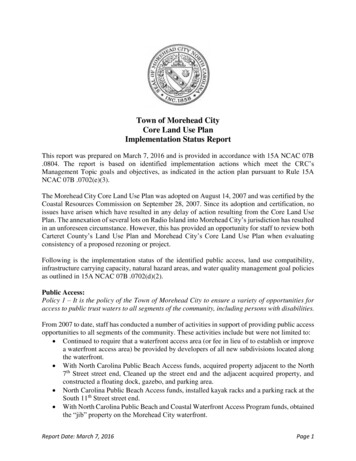
![Welcome [ uky.edu]](/img/13/morehead-20catalog-20s19.jpg)
